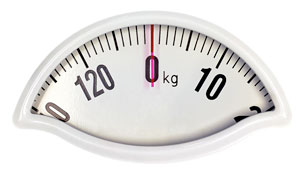Know and Share Your Weight in Kilograms
2017-05-10
Some medication doses are based on body weight or on a combination of weight and height. If your doctor is writing a prescription and asks for your weight, would you answer in pounds or in kilograms? Usually, medication doses are calculated using body weight in kilograms. Confusion about whether a person's weight is stated in kilograms or pounds can lead to serious harm.
ISMP Canada received a report about a child who was given the wrong dose of a medication because her weight was misunderstood. The child was seen in a clinic for a sore throat. Two days later, test results showed that she had a throat infection, and her mother was called. Over the phone, the mother reported the child's weight as "18". This information was shared with the doctor, who prescribed an antibiotic at a dose based on a weight of 18 pounds.
The child was brought back to the clinic 5 days later, with a fever and sore throat. This time, the doctor weighed the child and discovered that her weight was 18 kilograms, or 40 pounds. The antibiotic dose had been based on the wrong body weight and was too low to treat the infection.
SafeMedicationUse.ca has the following advice for consumers and parents to help prevent mistakes with medication doses based on weight:
-

-
Know and record your current weight in kilograms. Be sure to state the units (kilograms) when you are talking to healthcare providers about your weight. If your weigh scale measures only in pounds, work with your healthcare provider to do the conversion from pounds to kilograms.
-
Update weight changes for children regularly. Be sure to mention your child's weight, height, and age to healthcare providers. This information is especially important if a new medication is being started or a medication dose is being changed.
-
For children less than 12 years old, expect healthcare providers to weigh your child at every visit. All other children should expect to be weighed every year. Be sure to tell your healthcare provider about any weight changes, including normal growth and development.
Medication safety bulletins contribute to Global Patient Safety Alerts
This newsletter was developed in collaboration with Best Medicines Coalition and Patients for Patient Safety Canada.
Recommendations are shared with healthcare providers, through the ISMP Canada Safety Bulletin, so that changes can be made together.
|

